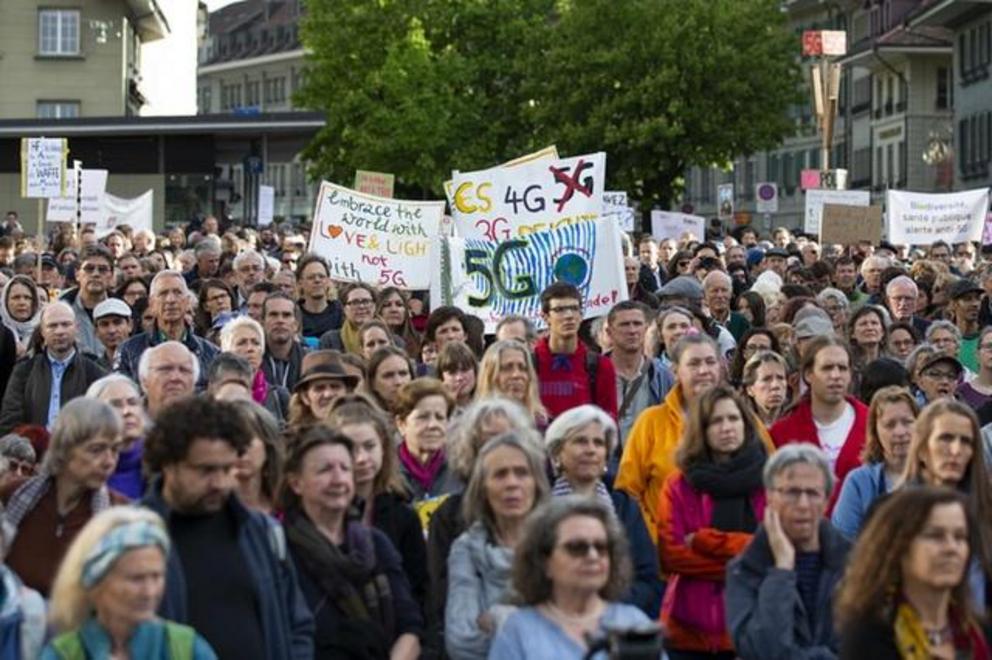Swiss citizens take to the streets to protest 5G implementation as new illnesses start at same time
Over 1000 people take to the streets in Bern, Switzerland to protest 5G roll-out.
If you want to get an idea of what will happen in the U.S. when the telecom companies start rolling out 5G networks with new towers in your local neighborhood, take a look at what is happening in Switzerland today, where 90% of the population is now exposed to the new 5G networks.
People are getting sick, and they are marching in the streets to show their opposition to the new networks.
Yahoo News reports:
Thousands of people protested in the Swiss capital Bern Saturday (9/21/19) over the roll-out of a 5G wireless technology across the country, which they fear could damage people’s health.
The protesters, many carrying placards, gathered in front of the Swiss parliament building, in a bid to stop the construction of more 5G-compatible antennae.
“The fact that so many people turned out today is a strong sign against the uncontrolled introduction of 5G,” said Tamlin Schibler Ulmann, co-president of Frequencia, the group that organised the rally.
[C]ritics in Switzerland argue that the electromagnetic radiation the new system emits poses unprecedented health and environmental risks compared to previous generations of mobile technology.
Online petitions have helped persuade several Swiss cantons — in Geneva, Vaud, Fribourg and Neuchatel — to postpone the construction of antennae as a precaution.
The Swiss Federation of Doctors (FMH) has also argued for a cautious approach to the new technology.
The first injuries due to 5G are now being reported in Switzerland, according to Physicians for Safe Technology.
The first reported injury of 5G in a news report comes from Switzerland, where 5G has been launched in 102 locations. The weekly French-language Swiss magazine L’Illustré interviewed people living in Geneva after the 5G rollout with alarming details of illness.
In their article, With 5G, We Feel Like Guinea Pigs, posted July 18, 2019, they report neighbors met to discuss their many common symptoms and many unanswered questions.
As soon as the antennas were installed, several residents and entire families in the heart of Geneva reported similar unusual symptoms of loud ringing in the ear, intense headaches, unbearable earaches, insomnia, chest pain, fatigue and not feeling well in the house.
29-year-old Geneva resident, Johan Perruchoud, called up Swisscom and was told that indeed the 5G cell towers were activated on the same day he began to feel the symptoms. When others called Swisscom they were told everything is legal and within guidelines.
Dr. Bertrand Buchs, who has also called for a 5G moratorium, states he has seen more and more patients with similar symptoms.
He notes, “In this case, our authorities are going against common sense … we risk experiencing a catastrophe in a few years… no serious study exists yet, which is not surprising when we know that this technology was developed in China, then to the United States. In Switzerland, we could open a line for people who feel bad, listen to these complaints and examine them. Our country has the means and the skills. The debate must be launched because the story is not about to end.”
Are Telecom Giants Influencing U.S. Government to Override Local Opposition to 5G?
As Health Impact News reported back in June this year (2019), local opposition to the installation of 5G networks has been strong here in the U.S. as well, as more than two dozen municipalities, counties, and organizations are suing the FCC and the US Government for forcing them to submit to every desire of telecom companies as they rollout 5-G. Opposition has been strong in the U.K. as well, where one man was sentenced to jail for speaking out.
Paul Bischoff, a tech journalist and privacy advocate, recently compiled data regarding telecom’s political contributions to influence policy that benefits their industry.
Internet service providers in the United States have spent more than $1.2 billion on lobbying since 1998, and 2018 was the biggest year so far with a total spend of more than $80 million.
Comparitech researchers compiled and analyzed 51 ISPs’ lobbying expenses from the US Senate’s Lobbying Disclosure Act database, which dates back to 1998.
Here are the highlights of our analysis:
- 2018 was the biggest year yet for ISP lobbying at $80 million.
- Top spenders include AT&T, Verizon, and Comcast, which have amassed lobbying expenses of $341 million, $265 million, and $200 million, respectively since 1998.
- Since 2011, yearly spending on lobbying across all ISPs hasn’t strayed below $72 million.
- The largest amount spent by any provider in any year was AT&T in 1999, at almost $23 million. AT&T’s acquisition of Ameritech Corp accounted for much of this, and the merger eventually led to the creation of America’s largest telecom company.
- Total spend from 2016 to 2019 is set to exceed lobbying expenses between 2012 and 2015, which totaled $295 million.
- Lobbying in favor of mergers and acquisitions accounted for many of the biggest expenses for individual ISPs in a single year.
- $1.2 billion has been spent by ISPs on lobbying since 1998.
Top 25 ISP Lobbying Spenders in 2018
ISP2018 Lobbying Expenses
AT&T$15,820,000.00
Comcast$15,072,000.00
Verizon$10,489,000.00
Charter Communications$9,390,000.00
Deutsche Telekom (T-Mobile USA – 2007)$8,105,000.00
Cox Enterprises$3,450,000.00
CenturyLink$3,360,000.00
Sprint Corporation$3,130,000.00
América Móvil$2,270,000.00
DISH Network$2,060,000.00
Ligado Networks$1,710,000.00
Viasat, Inc.$890,000.00
Frontier Communications$526,583.00
Granite Telecommunications$510,000.00
U.S. Cellular$500,000.00
Altice USA$400,000.00
Puerto Rico Telephone Company$360,000.00
General Communication, Inc (GCI)$320,000.00
Iridium Communications$210,000.00
Liberty Cablevision of Puerto Rico$200,000.00
ATN International$180,000.00
C Spire$120,000.00
Telephone and Data Systems, Inc (TDS)$110,477.00
Mediacom Communications$90,000.00
Level 3 Communications (Now CenturyLink)$85,000.00
What is ISP lobbying?
Lobbying expenses include any money used to influence local, state, or federal legislators and regulators. According to the IRS, that includes expenses incurred to participate or intervene in any political campaign for or against a candidate for public office. Attempts to influence the public about elections, legislative matters, and referendums also count as lobbying.


